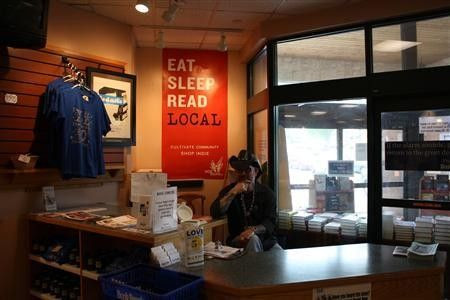As Borders exits, indie bookstores fight other Goliaths

A decade ago Austin bookseller Steve Bercu faced a Texas-sized threat to his independent store: Borders was planning to build a megastore just blocks away. So he dug in his spurs and garnered community support that kept the franchise out of his area.
As of last week the bankrupt national retailer is no longer a danger as the liquidation of its remaining stores ensues. But Bercu's 40-year-old BookPeople, now an Austin institution encompassing 28,000 square feet of selling space on two floors, is up against the same challenges that led to Borders' demise - steady growth of e-books and the increasing lure of Amazon and other online sellers offering discounts over brick-and-mortar pricing.
To counter those trends, he plans to further tap Austin's penchant for all things local, including its vibrant cultural scene. A peek at upcoming events revealed why many consider the store a destination: Western authors Stephen Harrigan and C.J. Box were on the roster, as was First Amendment supporter and porn publisher Larry Flynt. Humorist Kinky Friedman is a repeat customer.
"We're just trying to figure out what works here," said Bercu, who in 2001 founded the Austin Independent Business Alliance, which represents some 750 local businesses. "We have been modeling ourselves on the needs of our market and our customers here at this location for the last 15 years."
"We're in schools, we're at everybody's silent auctions," he said, adding that 2010 was the best year in the store's history. "We're deeply involved in our community."
It may take such fervent commitment to community to overcome the odds facing brick-and-mortar sellers of new books. Last week Borders, No. 2 behind Barnes & Noble, said it would jettison its remaining 399 stores after failing to find a buyer. The news was mixed for independents, which could benefit from a void in the market but must work a lot harder to maintain customers amid new means of selling books.
"Consumers have a lot more options available to them now," said Dianna Hu, a retail analyst with Sageworks, which analyzes the financials of private companies.
"With Borders gone, there will be an empty spot that these independent bookstores can fill," she said. "They have to be smart about it. A lot of them depend on customer loyalty, so they have to be really creative and find ways to foster that."
Performance data on independent stores is a bit murky. Sageworks, which combines results for independent sellers of books, periodicals and music, shows sales trending downward for the past three years, averaging 5.9 percent lower each year.
But the Association of American Publishers, which represents the publishing side of the business, found that while larger chains have seen erosion during the three years ended in 2010, independents remained relatively stable. The group released preliminary highlights from a new study in May; it has not yet put out the full results.
UPPING THEIR GAME
Across the country, independents have stepped up local involvement, offering new ways to ingratiate themselves to their readers.
On Chicago's North Side, the Book Cellar provides a combination bookstore and wine café where customers kick back and take in an expanding diet of book clubs, author readings, essay contests and children's storytelling - even regular comedy revues.
In recent years, owner Suzy Takacs has been progressively spending more time outside the store, toting popular tomes to venues as diverse as casinos and farmers' markets in an effort to boost revenue and visibility.
"I call myself a book Sherpa," joked Takacs, who has managed to grow incrementally since the store's founding in 2004. "I will do whatever needs to be done."
Ditto for Betsy Burton, longtime co-owner of The King's English Bookshop in Salt Lake City. Besides running a carefully curated store inside a converted eight-room house - replete with oriental rugs and ample reading nooks - Burton frequently ties events to local partners such as film festivals and libraries. She is soon rolling out her own home delivery service.
"We are proactively thinking our way around this whole issue and addressing it every way we can," said Burton, 65, who managed during the downturn by cutting back employees' hours. "Being at the center of our community is central to our strategy."
The American Booksellers Association, which represents some 1,500 independent operators nationwide, has been helping members bridge shortcomings in technology by providing an ecommerce platform and an alliance with Google to sell e-books. The association has also been a proponent of new laws to rein in online sellers' ability to avoid taxing the sale of books over the Internet.
"We feel there are real opportunities for independents right now," said Len Vlahos, the association's chief operating officer, noting that net membership has increased since 2009. "They've become very savvy businesspeople."
Whether or not intensified outreach adds up to long-term success remains to be seen. Whatever happens, one thing is certain - established stores like Austin's BookPeople aren't going anywhere without a good fight.
"I'm a firm believer in the need for physical showrooms for books," Bercu said. "There's no way you can replicate a bookstore environment on line."
© Copyright Thomson Reuters 2024. All rights reserved.




















